All Star Trek Movies Ranked
13Star Trek V: The Final Frontier
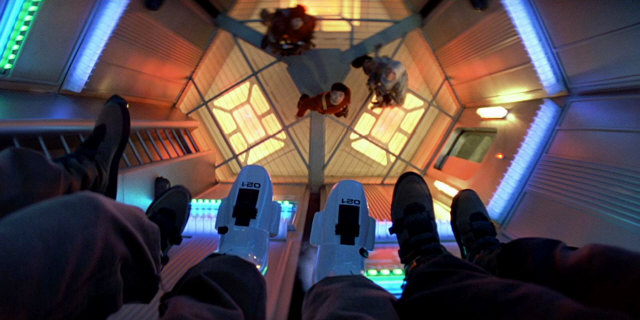
Fans as well as occasional viewers almost unanimously rate "Star Trek: The Final Frontier" (1989) as the worst feature film of the whole franchise. I like how the writing spotlights the friendship among the Enterprise crew, especially Kirk, Spock and McCoy. But other than that, no other Trek movie is so sloppily written and directed. No other Trek movie comes with so much plain silliness, such as Kirk's self-aggrandizing rock-climbing, Uhura's fan dance, Spock riding a blue unicorn, Kirk hugging Spock in the presence of the Klingons, Spock's misconception of "marshmellons", the three heroes singing at the campfire. Errors abound, such as Kirk's fall that Spock stops immediately a few centimeters above the ground, the "Deck 78" on the Enterprise, the impossible travel to the center of the galaxy or the WTF moment in which Sybok seizes control of the Enterprise without meeting any resistance. My impression is that much of what turned out stupid or wrong was included by William Shatner on purpose, in an attempt to repeat Nimoy's success with "The Voyage Home", and for a little bit more of a dramatic impact. But Shatner should have left the writing and directing to people who can do better. Read the full review.
12Star Trek Into Darkness
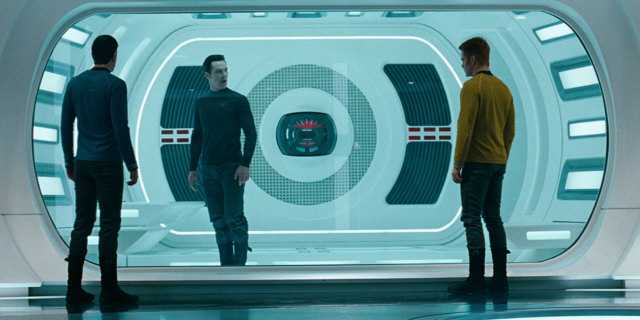
"Star Trek Into Darkness" (2013) is a bit more exciting than even "Star Trek (2009)". Yet, it fails as a Trek feature film for three important reasons. The first big mistake of the flick is that it loses sight of the human dimension that is so important for Star Trek. Harrison (Benedict Cumberbatch), Kirk and Spock are jumping and flying around like superheroes, in a desperate attempt to poach viewers that are not interested in genuine science fiction. The second error is that the script incorporates elements that I only know from bad fan fiction: a secret organization that builds a massive warship in no time, an extended shooting orgy in which the ships are reduced to scrap, the involvement of established characters for no good reason but namedropping and finally a totally miscarried homage to a previous movie. This just tells me that the producers and writers don't really want their work to be taken seriously as a new, independent direction of Star Trek. The most definite failing on the long term is that their Star Trek is solely about chasing villains (or rather, about trying hard to prevent them from blowing up starships, cities and planets, and often in vain). "Into Darkness" wipes out the last bit of optimism that was still left in the new timeline after "Star Trek (2009)". Read the full review.
11Star Trek Nemesis
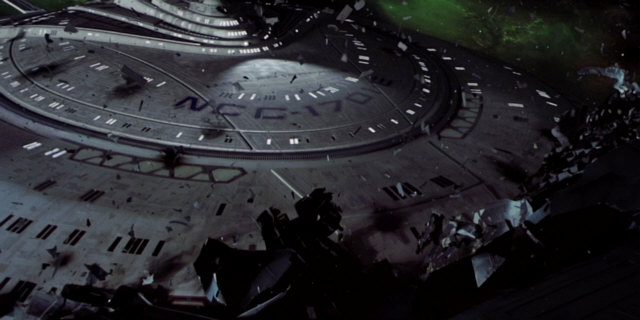
"Star Trek Nemesis" (2002) is an enjoyable movie for the most part, but not really more. The problem I see with its premise is a general problem with Star Trek on the big screen. Even before the Abrams movies transformed Star Trek into an action franchise, most feature films had comparably simple plots and relied heavily on a good/evil contrast, whereas the Star Trek on TV and especially TNG could do almost completely without villains. "Nemesis" is a reiteration of the topic that would have had a greater potential because the villain Shinzon is Picard's clone. But Shinzon is underwhelming, and his nature and his interaction with Picard has hardly any consequences in the plot, which inevitably leads to a big shoot-out. Also, considering that the movie is about the Romulans and their cousins, the Remans, we hardly see anything of them, much less does the script forge any ties to Sela, Spock's reunification movement or Picard's previous stay on Romulus. It seems that everything in the story is subordinated to the goal of showing as much action as possible as late as possible. Read the full review.
10Star Trek Beyond
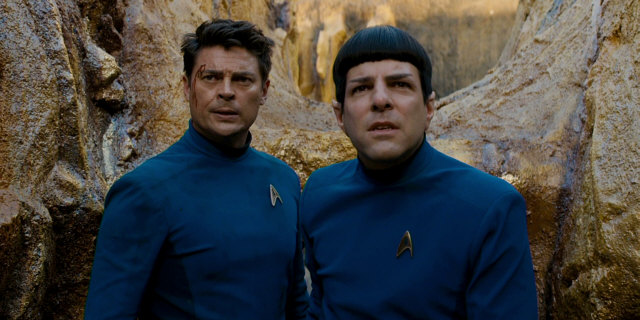
"Star Trek Beyond" (2016) is the first Abramsverse movie that excels in the depiction of the Enterprise bridge crew and their interactions. The new old characters finally stick together, like the family their Prime Universe counterparts were in TOS and the TOS movies. Especially McCoy (Karl Urban) scores points in a plot where he and Spock are isolated and have to work together. Also, Kirk (Chris Pine) is not a glorified jerk any longer but a no-nonsense leader his crew rightfully looks up to. However, single good scenes or sequences aside, the movie is let down by its dumb action-driven plot and by Krall, the most disappointing antagonist in the whole history of the franchise. The great actor Idris Elba is wasted to play this villain without visible facial expressions (thanks to a thick latex mask) and also without a plausible motivation. The latter ultimately makes the whole story of "Beyond" sort of pointless. Also, like already "Into Darkness", this movie again shows crew members with superhuman forces. Moreover, in scenes with much action are it is not recognizable who is who and what is happening. Read the full review.
9Star Trek (2009)
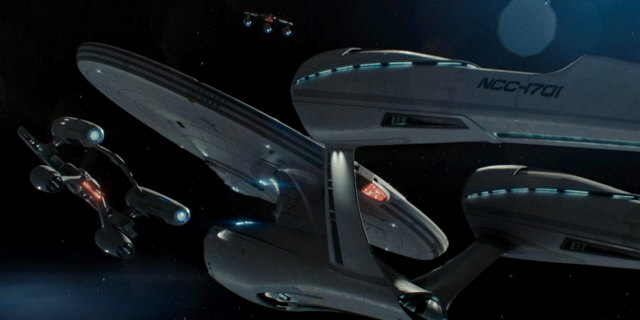
"Star Trek (2009)" is visually compelling and set a standard for everything in the franchise that followed, whether we like it or not. It is exciting. I have to concede that it does convey some parts of the message of Gene Roddenberry. I can even imagine he would have approved of it, except for the destruction of Vulcan. But overall the movie suffers from its contrived premise and from the reduction of the incredibly rich legacy to the dumb formula "Star Trek = Kirk + Spock + a wee bit of McCoy, Uhura, Scotty, Sulu, Chekov + some sort of Enterprise". It tries to be an origin movie when it can't be one because of the parallel universe setting, turning the plot into a totally implausible chain of coincidences. It depicts Kirk as an asshole, redefines old Spock to a total loser and fails to provide the supervillain with a motivation. Two of Star Trek's most popular planets are destroyed just for a little extra thrill in this one movie. The questionable design decisions (such as the built-in brewery of the Enterprise) and the filming and editing crimes that make everything with action in it almost unwatchable are just the icing on the cake. Read the full review.
8Star Trek III: The Search for Spock
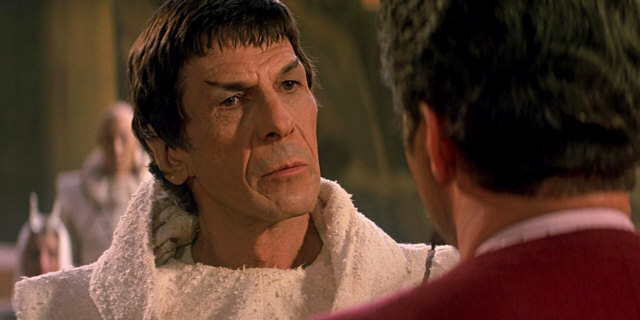
The immensely successful "Star Trek: The Wrath of Khan" left a small loophole for Spock to come back when he said "Remember" to Doctor McCoy, which could have meant anything at the time it was shot. "The Search for Spock" (1984) is built on this premise. But it feels odd that the title readily gives away that Spock would return, whereas in the story it is rather a chain of unlikely coincidences that allows to revive Spock eventually. Still, I think it is an intelligent idea that a Vulcan's mind can be preserved by transferring it to another person, and that McCoy of all people is carrying Spock's mind. The dialogues, however, don't work so well. The actors have to deliver sometimes awkward lines and make strange gestures. They too often have a hard time not to let their roles appear as silly. Also, I just don't like Kruge and his Klingon company, who are just generic villains and much like a rehash of Khan's gang. Overall, I think that "The Search for Spock" is an enjoyable movie but falls short of its predecessor and its successor. Read the full review.
7Star Trek VI: The Undiscovered Country
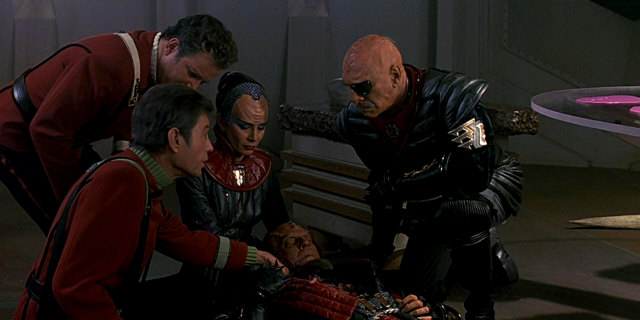
Many fans like this film more than I do. I agree that the idea to include a real-world development, namely the political changes in the former USSR, largely succeeds in "The Undiscovered Country" (1991). The Klingons were always intended to be the equivalent of the Soviets in space, and after all it had to be clarified why the Federation and the Klingons are allies at the time of TNG. "The Undiscovered Country" fulfills these expectations, but it lacks unique moments to remember. The beginning is quite promising, but the suspense only lasts until just after the Kronos One has been attacked and Bones tries in vain to save the Klingon chancellor. The movie becomes rather boring when Kirk and McCoy have been convicted and taken to Rura Penthe, although probably the contrary was intended. "The Undiscovered Country" gets thrilling again as late as in the space battle at the very end. While I love "Only Nixon could go to China", I dislike many other pieces of dialogue in this film, which I think are corny. In my view the lines are the second worst of all Trek movies after "The Final Frontier". Read the full review.
6Star Trek Generations
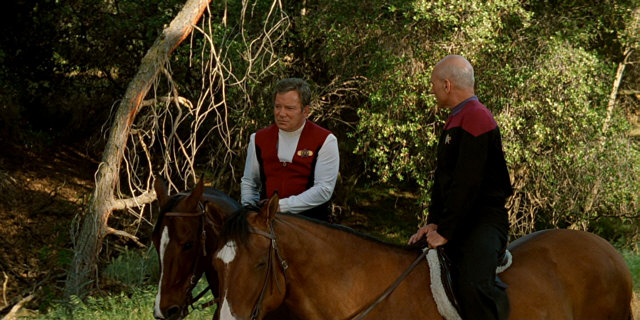
The idea that Soran (Malcolm McDowell) seeks a way back into the Nexus in "Star Trek Generations" (1994), thereby creating a connection between Kirk's and Picard's destinies, is intriguing. Soran as a character is convincing in that he is rather unscrupulous than really bad or mad. He does not seek profit or power but just wants to achieve happiness, something we unfortunately don't get to see in other Trek movie villains. However, the Nexus is practically omnipotent and can accomplish just too much to be useful as a plot device, and the concept poses more questions than it can possibly answer. It is also a bit sad that except for Picard and Data no one of the Enterprise-D crew speaks more than a few lines, unlike in TNG that used to have an ensemble cast. No matter what one might think about Kirk's role and Shatner's performance in the last few movies (which in my view was not always brilliant), he is given a worthy farewell and puts up a really great fight. This doesn't apply to my beloved Enterprise-D that falls victim to an obsolete Bird-of-Prey, which makes a bit angry still today. Read the full review.
5Star Trek IV: The Voyage Home
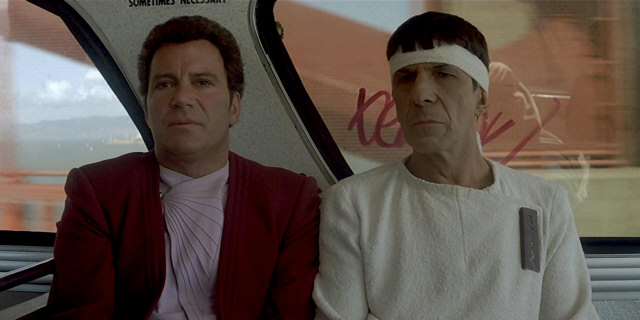
"Star Trek: The Voyage Home" (1986) concludes the story arc of the two preceding movies, but feels like a totally separate entity, rather than like the final part of a trilogy. "The Voyage Home" comes with a lot of humor that sometimes (and perhaps too often?) steal the focus from the two serious themes of saving Earth in the future and (through the fourth wall) of saving the whales in the present. There are countless funny situations and quotes, such as Spock's silencing of the punk in the bus, Kirk's remark that Spock has taken too much "LDS", Chekov's "nuclear wessels", Scotty's attempt to talk into the computer mouse and Chekov's rescue from the hospital. Still, I think the movie wants to and can still be taken seriously. I am pleased that people refer to it as "the one where they save the whales" still today, rather than "the one where they stumble through 20th century San Francisco". While much of it doesn't make sense and there is not much Star Trek in the sense of space exploration in "The Voyage Home", it does a great job reaffirming the friendship that exists between all members of Kirk's bridge crew. Read the full review.
4Star Trek: Insurrection
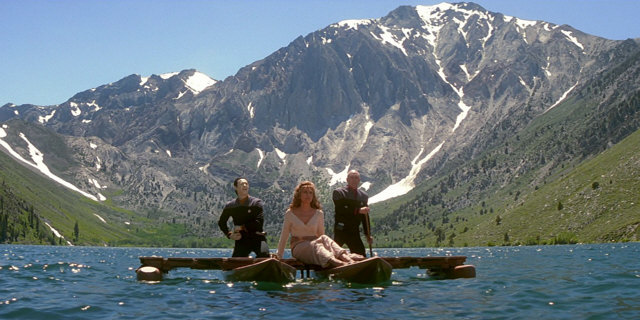
It may be a surprise to find "Star Trek: Insurrection" (1998) among my favorites. It is a comparably calm and pensive movie, and for those who had expected it to be "First Contact, Part II" it was probably a disappointment. "Insurrection" is about respect, trust and justice, topics that have made Star Trek the best in science fiction and that unfortunately fall short of action and/or villainy in most other Trek movies. The fact that it's not the destiny of the Federation or of the whole galaxy this time, but only of 600 people, doesn't make the whole struggle less relevant. On the contrary, the small Ba'ku planet is like a model, a test of general human(oid) behavior. We have rarely seen Starfleet personnel so committed not only to an obvious goal, but to basic principles of humanity as well as to their own consciousness. Apart from that, the overall beauty of the movie is overwhelming, and this includes the landscape of the Ba'ku planet as well as the emotions of the characters, especially the rejuvenation effects and Picard and Anij's tender love. There are quite a few weaknesses in the script and execution. But overall, I believe this is the most underrated Trek movie. Read the full review.
3Star Trek: The Motion Picture
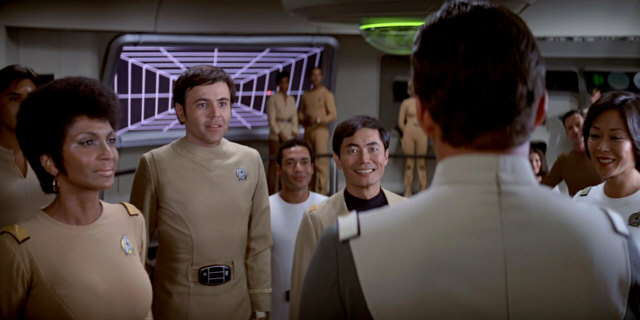
Although the first Star Trek feature film, "The Motion Picture" (1979), turned out a commercial success, it has been criticized by both fans and professional reviewers as "The Slow-Motion Picture" or something along these lines. Well, I have to agree that the plot of "Star Trek: The Motion Picture" is quite thin and could as well have been covered in the 45 minutes of a usual TV episode, especially considering the undeniable similarities to TOS: "The Changeling". Yet, I think that most reviewers were spoiled by the fast pace of the old TOS episodes as well as of the first Star Wars movie, so they focused on this lack of action as an alleged deficiency in the first Trek movie and underappreciated its cineastic qualities. "The Motion Picture" thrives on long VFX scenes and excellent pointed dialogues, although neither necessarily advances the plot. Most importantly it gives us a sense of the excitement to go out into space and encounter the unknown like perhaps no other science fiction film ever made. Also, "The Motion Picture" established a visual standard for what is known as the second (and by far most successful) generation of Star Trek today, a long run of movies and series that lasted until 2005. Read the full review.
2Star Trek II: The Wrath of Khan
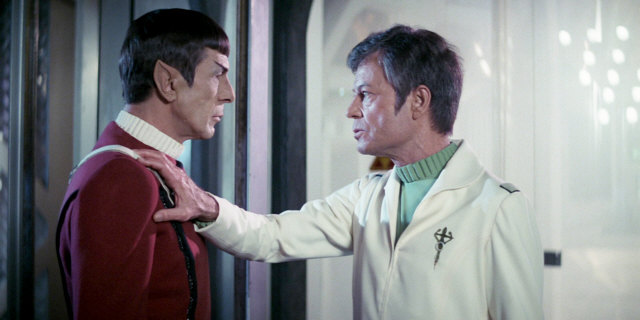
"More action" was quite obviously the motto of this second Trek feature film. "Star Trek: The Wrath of Khan" (1982) brings the excitement that the audience may have hoped for and that was missing in "Star Trek: The Motion Picture". While it is visually not quite as impressive as its predecessor (owing to its lower budget), "The Wrath of Khan" is full of story highlights. For many years the battle in the Mutara Nebula remained the most thrilling action sequence ever to appear in a Trek movie or episode. It was a great idea to bring back Khan (Ricardo Montalban) from TOS: "Space Seed", one of the more impressive guest characters of TOS. Khan is a fan favorite as a villain still today, because he has a strong motivation, because he is very emotional and because he is a match for Kirk. Speaking of emotions, it is clear that "The Wrath of Khan" stands out from the usual Trek stories because it allows the unspeakable to happen when Spock dies in the end. "The Wrath of Khan" with its theme of a villain that wreaks havoc set a standard, one that is unfortunate in hindsight because many movies tried in vain to recapture its spirit instead of coming up with new ideas, culminating in an inappropriate knock-off in "Into Darkness". Read the full review.
1Star Trek: First Contact
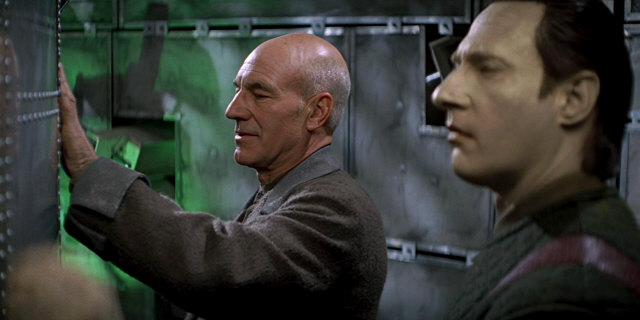
"Star Trek: First Contact" (1996) still is and may forever remain my favorite Trek movie. The film manages to establish a somber and menacing atmosphere without abandoning the basic optimism of Star Trek. It was almost a no-brainer to bring the Borg to the big screen. Telling the story of Cochrane's first warp flight was a brilliant idea likewise. "Star Trek: First Contact" has an excellent balance between the eye-candy most fans expect and the development of the story and of the characters. Since the movie is remembered most of all for its great deal of action, many fans who watch it again after a couple of years are surprised that there are some well-directed calm scenes as well. The story focuses on Picard and Data again, but gives the other characters more to do than in "Generations". In particular, the idea to isolate part of the crew in the ship that is being taken over by the Borg and part on the planet to help Cochrane proves successful in this regard. Finally, it is almost needless to mention that the writers and the director did a real quality job, more so than in "Generations". No doubt: "Star Trek: First Contact" is the best Trek movie. Read the full review.
See Also
Star Trek Movies - overview of TOS and TNG movies (until 2002)
Abramsverse Movies - overview of Kelvin Timeline movies (since 2009)















